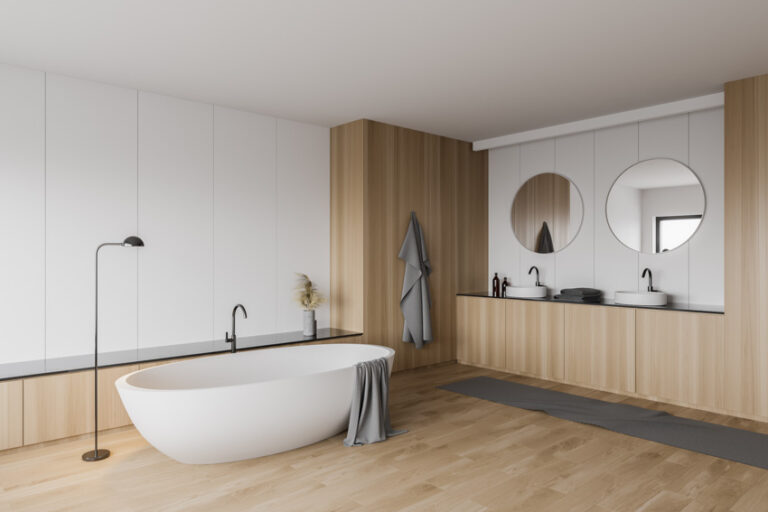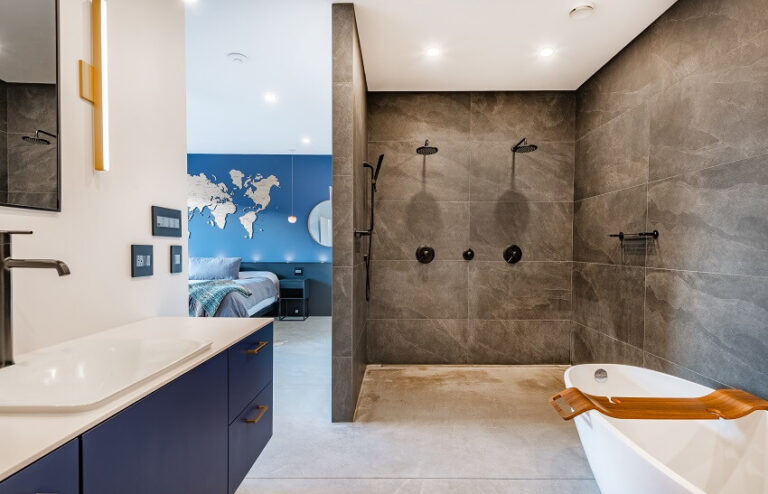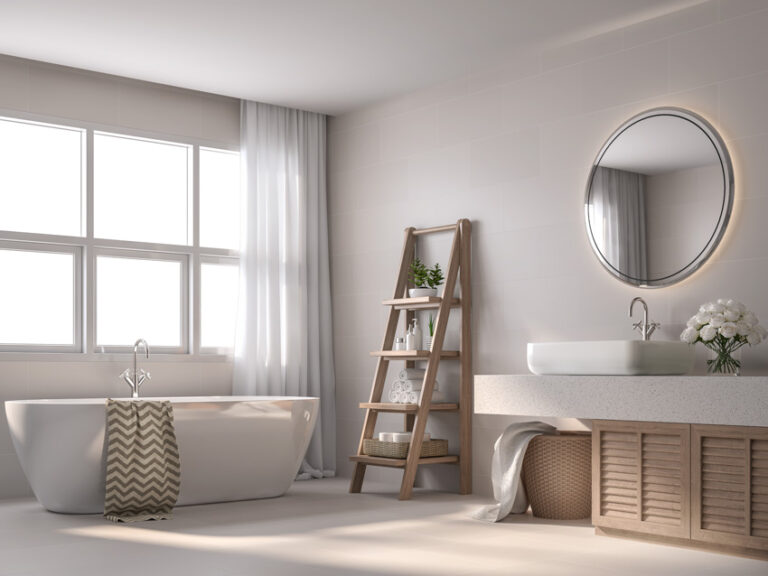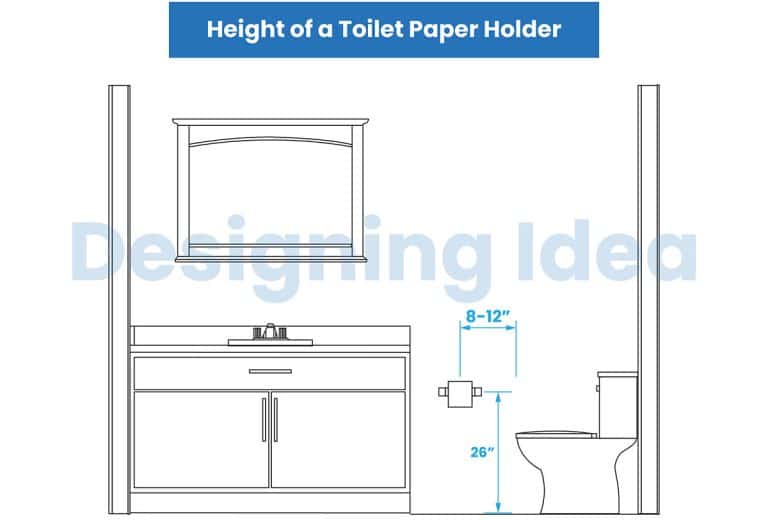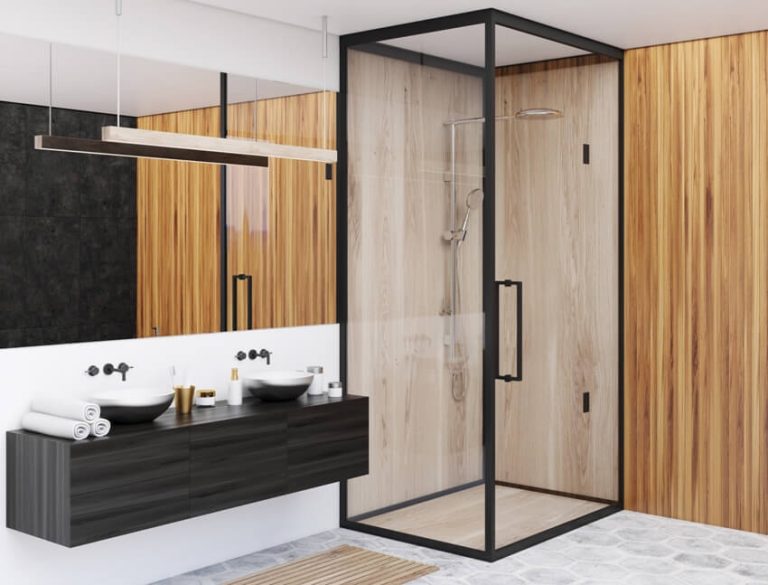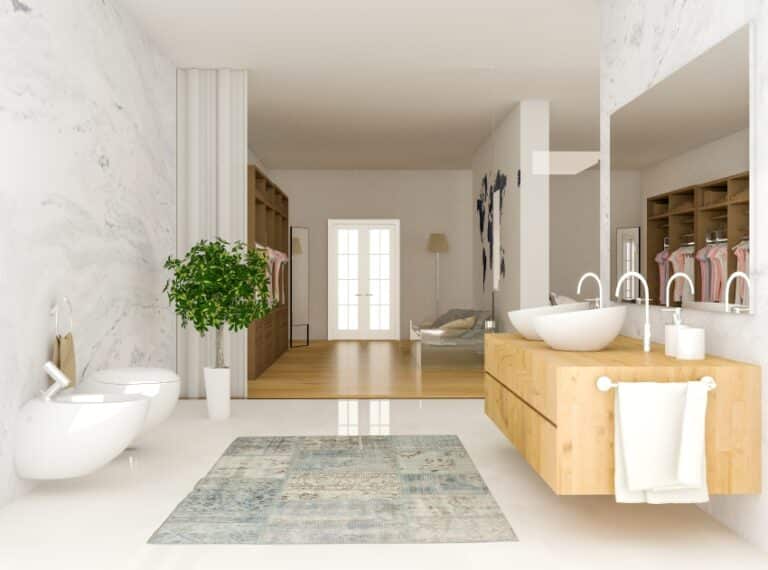9 Types of Shower Doors For Every Bathroom Design
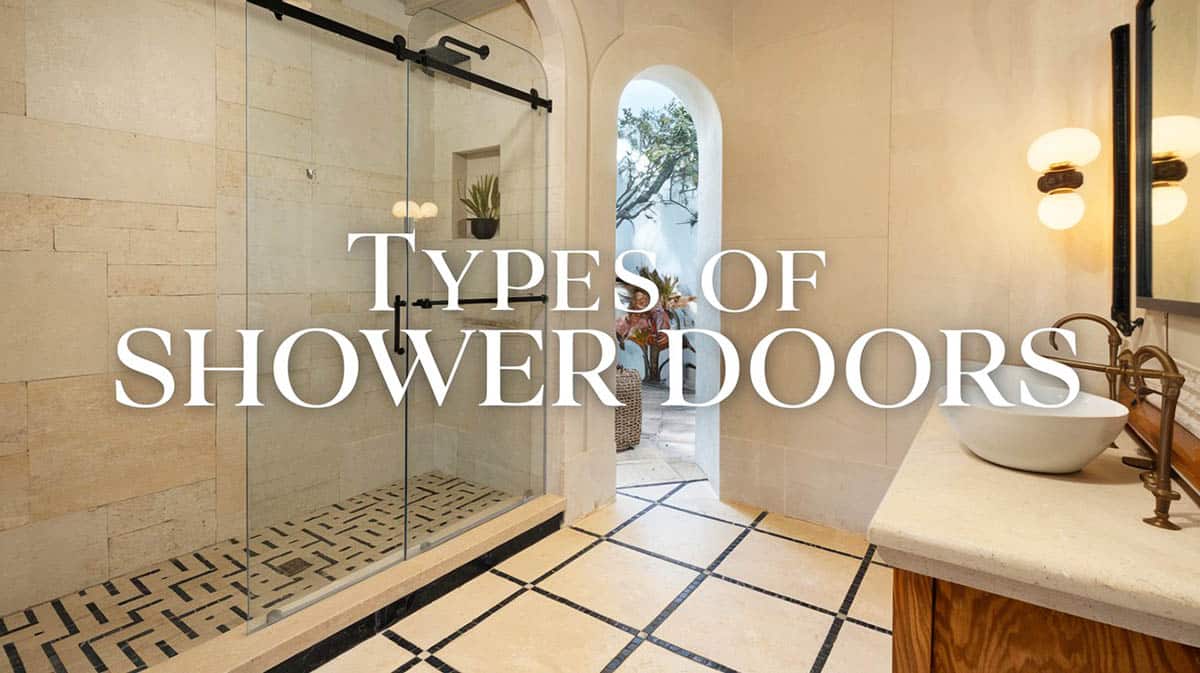
Investing in the bathroom is one of the best decisions you can make when considering a remodel for your home. A new shower can make a grand impression, and selecting the right door is important. Below, you’ll find different types of bath enclosures and see popular shower partition styles such as sliding, hinged, bi-fold, steam, and pivot to choose the one that’s right for you.
One benefit of an aesthetically appealing shower is its ability to transform the bathroom into a more pleasant environment. One large part of creating the atmosphere you want can be achieved depending on the type of enclosure option you choose. Certain glass shower door brands such as Kohler, Basco, Sterling, and Fleurco have a wide range of types, shapes, and sizes that perfectly fit and beautify your space. See our ultimate guide to bathroom showers for more designs.
There are generally three types of shower designs available. These are stand-alone, corner stand-alone, and bathtub showers. The bathroom door you need will largely depend on the style of shower you have or are installing in your bathroom. To choose a door, you will need to consider the opening size of the bath area and the amount of space you need for an opening.
Quicklist: Different Shower Door Types
- Sliding Doors
- Pivot Screens
- Hinged Doors
- Round Enclosures
- Neo Angle
- Bi-Fold
- Steam Doors
- FramedDoors
- FramelessDoors
Shower Doors
Of the various types of bath enclosure doors, the most prominent and popular options are as follows.
Sliding Enclosure Doors
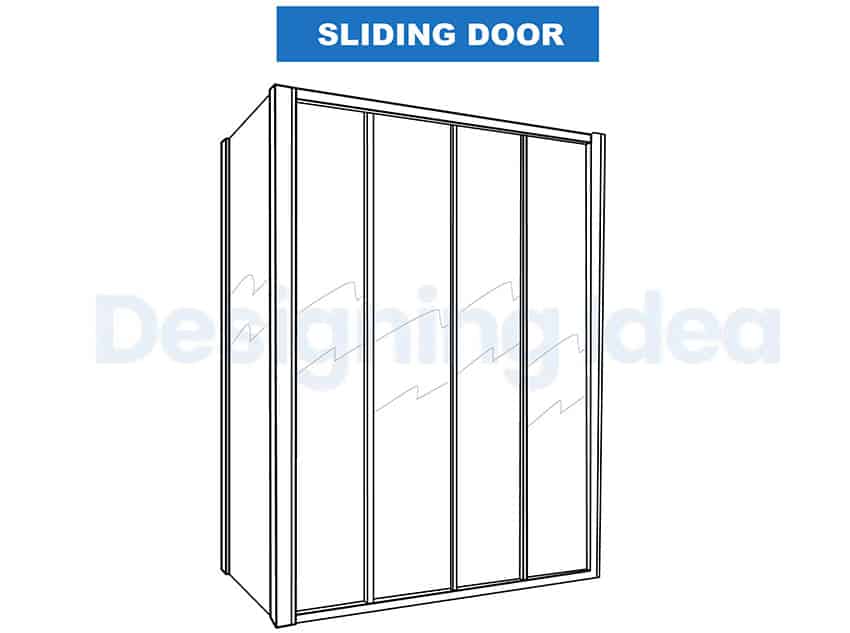
Sliding or bypass bath screens are most popular for consuming a minimum amount of space and offer wide shower openings that take up at least 60 inches. These doors consist of two or more panels, sliding against each other, attached to the sliding track from the top and bottom rail.
“A three-panel slider offers greater tub access. This feature is particularly useful for parents who are bathing toddlers or for someone looking for elbowroom to stretch out in the bath.” – Editors of Fine Homebuilding, Taunton Press, Renovating a Bathroom
These can be used in freestanding showers or configured appropriately on bathtubs. Sliding doors are often used for bathtub showers, alcoves, and corner stand-alone units.
Pivot Door
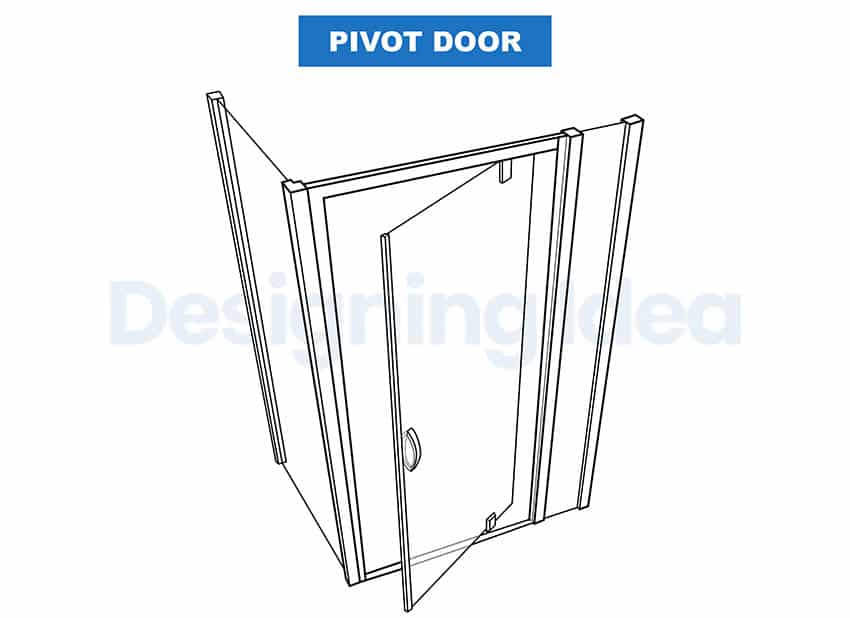
Pivot showering enclosures are operated through a pivot hinge that is attached to either side of the partition, allowing a 180 degree and can turn outwards from one side. Additionally, the door can be revolved around the center of the hinge and is attached to the center instead of the sides. Other names for pivot styles are one-panel swing and swing-open doors. Pivot bathing screens are often installed in freestanding bathroom cubicles or alcove showers. Pivot designs are often used in showers with small openings, typically 36″; however, they can reach as wide as 48″
Hinged Door
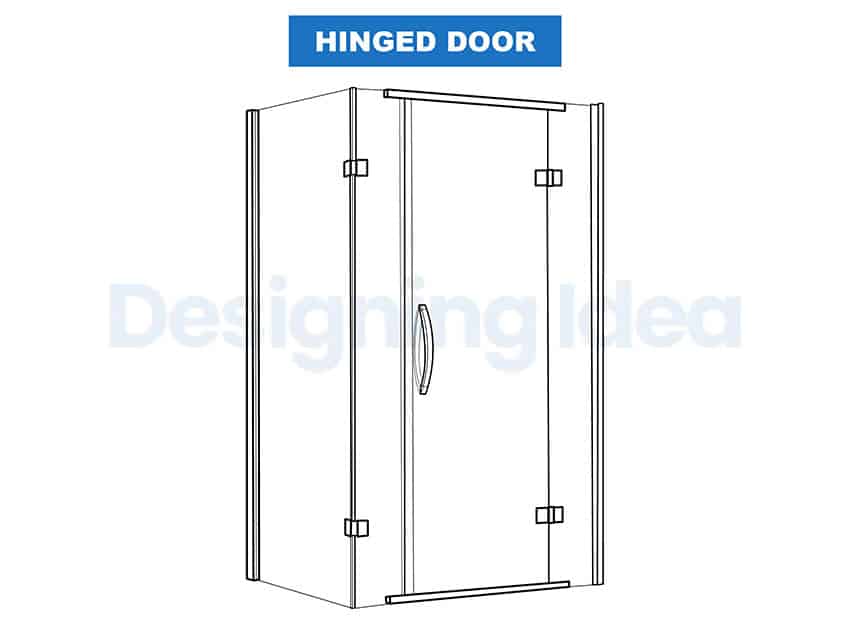
A hinged door resembles a typical swinging style that can be utilized as an enclosure door to open in one direction. The hinges can be screwed on the bathroom panels or the adjoining walls. Hinged bath chambers are the most popular in freestanding cubicles or alcoves. Hinged bath panels are often referred to as side mount hinge doors due to the placement of the hinges at the top and bottom. One benefit of this style is that it provides more support, preventing the need for a header along the top. This setup is ideal for frameless enclosure styles.
Round Doors
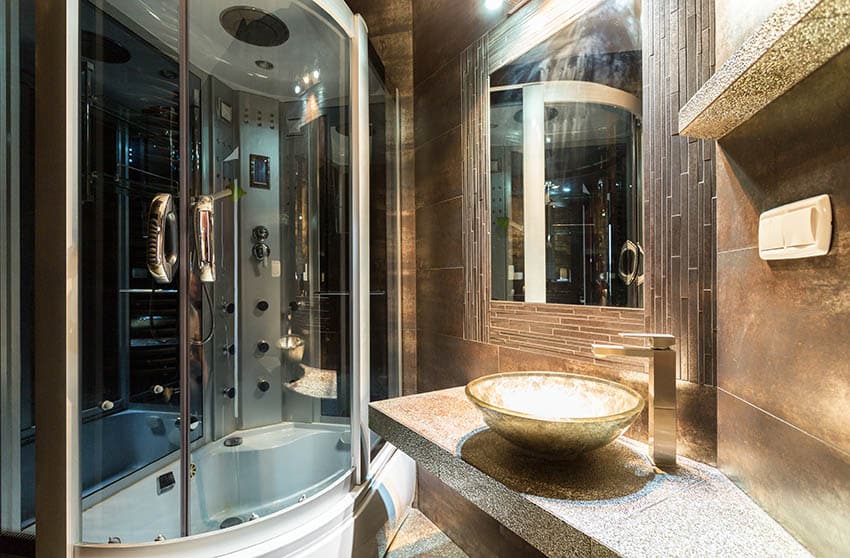
Round enclosure doors are usually opened inwards and contain additional space because of the curvy edges of the frame. Round enclosures are often installed as corner freestanding, which gives ease in maintaining purposes due to the curved shape of the door. The doors are connected at the top and bottom of the frame, providing more strength for smooth operation. The opening of this type is not fixed. Rather, it can usually be reversed to utilize left or right access entry.
Neo-Angle Doors
Neo-angle bathroom partitions consist of three panels, one as the door and the other as shower panels installed perpendicular to the walls. Neo-angle bathing enclosures are the best fit as a corner freestanding shower. This type of design can take up little space, or for larger bathrooms, the design can go big and become a beautiful focal point. The doors generally can be installed to swing open from right or left. Visit our gallery of luxury showers to see our gallery for more ideas and inspiration.
Bi-Fold Doors (Bath Screen)
Bath screen partitions are the best of both worlds, using a bypass door’s sliding track mechanism and a pivot door’s folding technique. Two panels of rectangle bath screen doors are attached by a bi-fold hinge and tightly folded inwards onto one another, forming a pathway to walk through. There are also tri-fold bath enclosures available. However, they are much less common than a standard bath bi-fold design.
A bi-fold door is a true space saver for a small bathroom design renovation. The folding mechanism is ideal for low-space situations with small walk-in openings, just like the accordion type of enclosure. The folding panels maximize space in a standing shower without interfering with traffic by swinging outward or inward.
Steam Doors
Want to feel the indulgence of a health spa from the comfort of your home? Steam showers equipped with digital controls and a small steam generator can produce a luxurious sauna-like experience that can leave you feeling relaxed and renewed.
If you are installing a steam shower, you might want to consider the perks of installing a steam door in the shower cubicle. To get the facts straight, the steam door is steamproof from all sides from the floor to ceiling to contain the steam inside the shower cubicle. Usually, steam doors can come in many design styles, from glass bypass (sliding) to square airtight pivot styles.
The above-mentioned types of shower partitions can be further categorized depending on the enclosures’ detailing. These types of enclosures can be grouped into:
1. Framed Showering Enclosures
2. Frameless Partitions
Framed Enclosures
Framed bath enclosures are generally made of aluminum or other composite materials, with frames running horizontally and vertically on the door. Framed enclosed bath space can be a little hassle when cleaning as framed glass dividers tend to collect water. A glass and an aluminum combination can accentuate the bathroom barrier and give it the unique flair of a traditional yet modern washroom. A polished chrome gloss finish can serve pretty well, too, for a framed washroom door in combination with a type of metal.
Frameless Doors
Frameless doors are often installed in every modern household because of their contemporary appeal. These enclosed panels are highly sought after due to their design appeal and beauty. The right shower door depends on the overall aesthetics of your home. A frameless shower door works very well with minimalist or modern interiors, but a framed shower door best suits a home with traditional design elements. [Source: Architectural Digest]
Added to the pros, the ease of maintenance and its simplicity is why frameless glass partitions are at the forefront. Frameless bathroom dividers are pretty flexible, and they visually create a feeling of spaciousness with the help of glass panes. See more walk-in shower designs here.
Door Glass Types
Nowadays, designers have developed interesting textures, patterns, and colors with variations in material types for bath encasement panels. Gone are the days when bath enclosures were instilled with only clear glass. Here are the top options.
Clear Glass
Clear glass is the most widely used type of bath partition, which lets maximum light penetrate and adds to the brightness and spaciousness of the whole glass cubicle.
HD Glass
HD glass is composed of less greenish tint, so you get a crystal clear view of the inside of the glass-paneled enclosure. The HD glass is capable of higher light transmission for a better definition.
Frosted Glass
Frosted glass has a distinct appearance and a texture that provides a blurry-like vision from one end providing visual control. One side of the glass has a frosted appearance, while the other is clear and smooth.
Rain Glass
What’s more interesting about rain glass is its ability to conceal marks or stains on the glass. The rain glass provides semi-privacy due to the specifically designed rain-like texture on either side of the glass.
Bronze Glass
Bronze glass consists of opaque characteristics for glass paneled enclosures topped with a darker tint that provides full privacy to the users. Bronze glass enclosures are popular in the market for their trendy, aesthetically pleasing nature.
Gray Glass
Gray glass is a silver-based darker tint that allows very little light to penetrate. These are a huge win in the market, similar to bronze glass enclosures, for their trendy appeal, which makes them stand apart from a traditional clear glass option.
For more help creating your bath area layout and design, check out this page about bathroom planning software. Using one of these programs, it’s possible to quickly try out different shower materials to help you find the right one.

